This is more a thought and possibly even a question to those who know more than me about the Flow concept. I have spoken about Flow in the past and use it as a core principle to engaging long term design.
However, recently it occurred to me that long term exposure to extremes in frustration or boredom, could alter our perception of flow.
For instance, you spend months in the boredom phase. You have little to no challenge. It seems reasonable that you would need to boost the level of challenge to help improve engagement and in turn try and get closer to this idea of flow. Below is the “ideal” mix of skill and challenge as described in flow theory – only this time plotted against time.
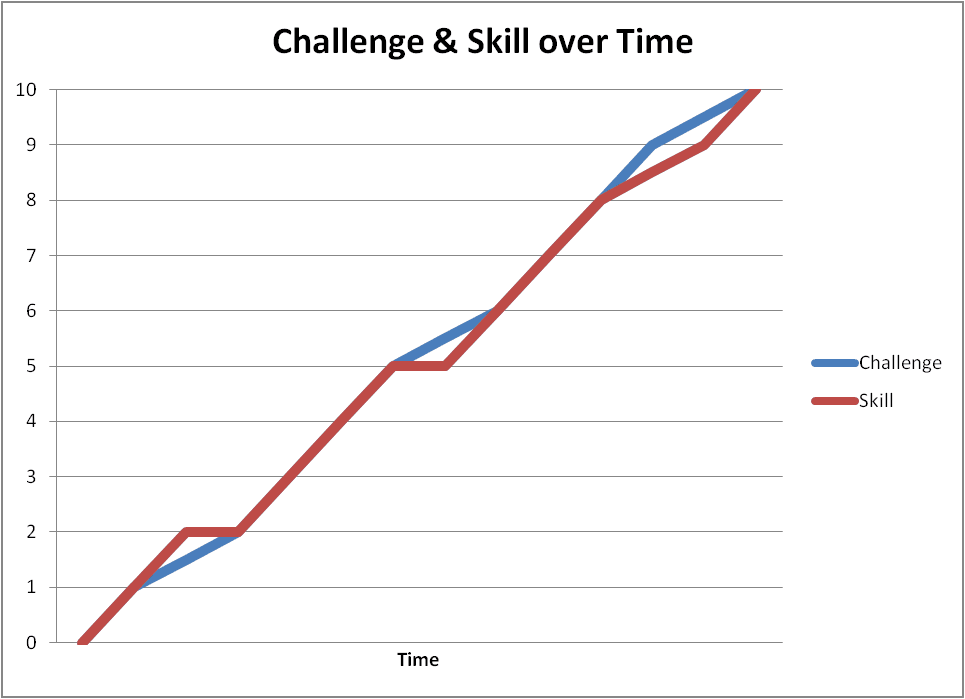
Now, if the challenge levels off, the likelihood is that your related skill level will begin to level off or possibly dip a little (due to lack of being pushed to develop it).

According to flow theory, this would put you smack bang into the boredom area. But what happens if you are suddenly challenged, surely this should be welcomed with open arms? The trouble is (as far as I can see and have observed), if the challenge is too far out of your new “bored” zone, you may actually struggle quite badly. Like a muscle that has not been used much, you have to build up the challenge – not suddenly ramp up. Overuse a muscle suddenly and it will get damaged.
Below to can see what I mean. The challenge rises, but you need to warm your skills up before you can start to match the new level of challenge. This would actually put you into the frustration area of Flow – the challenge is rising faster than your skills can manage.
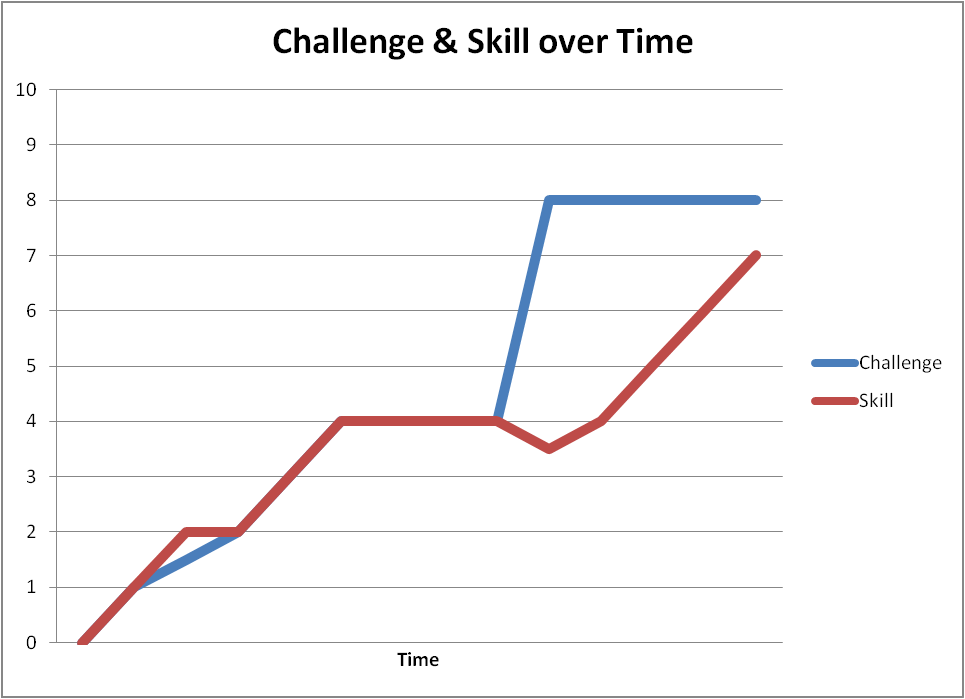
This is what I mean by the Flow Shift Bounce. Your boundaries between boredom and frustration shift if you are in one or other for a length of time. Sudden changes in challenge will cause your skills to have to bounce back. That is not always possible in a short space of time.
You could visualise it a bit like this. Whilst your skills warm up, the relative challenge you need to be in flow is much lower than it would have been if you had not had the challenge slump in the first place.
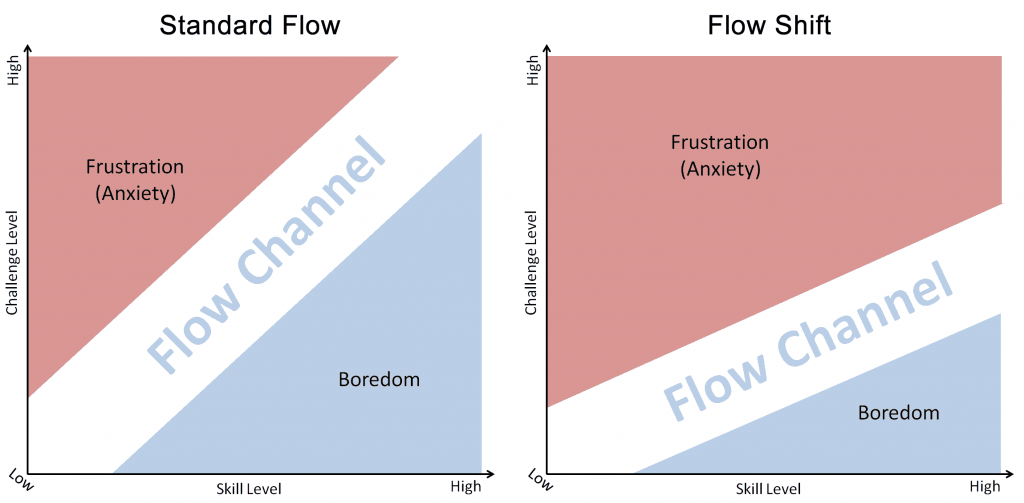
As I say, this is me thinking out loud, but I wonder if there really is something in this!?
Similar Posts:
- Flow & gamification: a misunderstanding
- Grinding to Mastery and Flow
- The Engagement Channel Model 2.0: Fun, Flow and Engagement

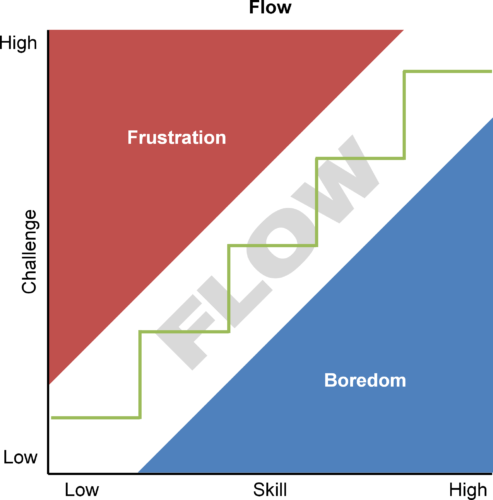
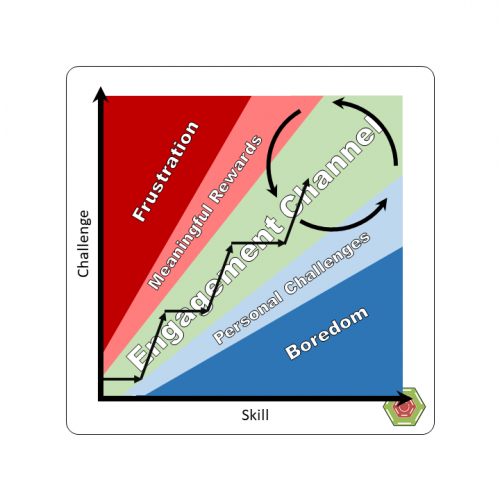

Hi Andrzej,
Based on your postulation, wouldn’t the effect be the same if the player or worker was either in a state of boredom or a state of flow? Either way, the individual involved would be operating at a particular skill level and a sudden drastic increase in challenge would move her right into the frustration zone because she lacked the skills to handle the new challenges. The essence of flow is to be able to introduce challenges in properly calculated increments that it encourages skill level to grow without overwhelming the player. So just adding challenges to a task for someone who is bored would be counterproductive if the challenges were more than what the individuals skill set was able to tackle and leverage on for growth.
What do you think?
Agreed. If you are in flow – everything needs to be moving at a similar pace over time. Change the challenge, change the skill needed to achieve flow again. Stay in any state too long and the perceived challenges and skill levels will alter. I think!
Hi Andrzej, hm…what you describe is the normal challenge for a game to adjust the ratio between challenge and skill over time, right? There are people that really will enjoy the fact to be for a long time in the ‘frustration zone’.
The important fact to be motivated is not (only) how long you are in the particular zone (boredom or frustration) but if you believe that this will change. If you are in the boredom zone the player has to believe in the system, the game, that it is able to increase the challenge in the near future.
In the frustration zone the player has to believe that (even if he is in this zone over a long period of time) he will be able to overcome the challenge. Of course it will become harder and harder to convince him over time. (I hope that my english is correct here 😉 )
Concerning your boredom-graph (the 2nd one): Shouldn’t that be the frustration-graph? For a long time the user faces a harder challenge-level than his own skill-level. And the gap even increases. So why is it called the boredom?
Or did I miss something here?
The boredom one is low challenge for extended time. This in turn can began to diminish the skill set. You then ramp the challenge up. What would have been a normal challenge before is now too hard as your skill levels (perceived or otherwise) have shifted. So it puts you into too high a challenge for your skill set – pushing you into the frustration zone (which is now at a much lower threshold) as your skills catch up.
Andrzej Marczewski
Sent from my mobile device
Ah, ok. No I don’t really see that. I can’t think back about one work activity so far where your skills will decrease just because of not being challenged enough. But It is an interesting thought.
But I still don’t understand your graph. Because even if the challenge stays stable and doesn’t grow anymore (like your graph is saying) it will challenge your skills at least on this level, right? So, once you have git to learn the skills for a particular challenge level and this level stays the same, your skills will not grow further but they won’t decrease. But your motivation will probably decrease if you don’t consider blue gamification 😉
So this is from experience. If you are not challenged for extended periods (years), your mindset changes. Your skill sets decrease and the challenge actually will also decrease over time. All the while you stop caring as well.
The thing is, flow is about a point in time where challenge and skill are perfectly balanced, sustaining that over time both need to increase.
Andrzej Marczewski
Sent from my mobile device
Ah, that’s interesting. I think that in the flow theory the challenge describes the difficulty level of a given activity and the gap between the challenge and the skills show how difficult the activity is relative to you.
If this is the case, than the challenge won’t decrease over time because the activity always stays the same. But the gap between challenge and skill will decrease and finally diminish. This is when boredom will start. So, yes, both have to increase in order to be able to stay in the flow. But if that is not the case than the challenge will not decrease because the activity stays the same. Of course your skill level will outgrow the challenge…
Again, the real point is, you can’t suddenly increase the challenge and expect someone in this phase to cope well.
Andrzej Marczewski
Sent from my mobile device